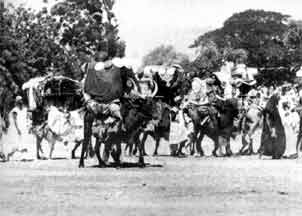1903 British Conquer North Nigeria

Nigeria
The British captured the mud-walled city of Kano in Northern Nigeria on February 3, 1903. The British subdued Northern Nigeria after a British resident of Southern Nigeria was murdered and his murderer escaped North. Once Kano fell, the leaders of the various tribes of Northern Nigeria agreed to indirect British control...
On February 3rd, the city of Kano in Northern Nigeria, with its ancient mud walls and a rich history of trade and culture, witnessed a transformative event: its capture by the British forces. This event was a milestone in the establishment of British dominance in Northern Nigeria, and it stemmed from a series of incidents that began in the southern part of the country.
The catalyst for the British campaign in Northern Nigeria was the murder of a British resident in Southern Nigeria. Following this incident, the perpetrator sought refuge in the north, prompting the British to expand their focus to the vast territories of Northern Nigeria in pursuit of justice and to assert their authority.
Kano, with its strategic location, was pivotal to this campaign. Its legendary walls, a symbol of pride and defense, would soon be tested against the might of the British military. After a period of conflict, the city fell under British control, signaling a shift in the dynamics of the region.
The significance of Kano's capture resonated across Northern Nigeria. Local tribes, realizing the extensive resources and military prowess of the British, began reconsidering their stance. Instead of opting for direct confrontations, which might result in extensive losses, many tribal leaders decided on a more pragmatic approach.
Given the circumstances, leaders of various tribes of Northern Nigeria negotiated terms with the British. Rather than resisting further and risking direct colonial rule, they agreed to a system of "indirect rule." This administrative approach allowed local chieftains and rulers to maintain a degree of governance over their people and uphold their customs. However, they did so under the umbrella of British authority.
This system benefited the British administratively, as it allowed them to control the vast territories without the intricacies of direct management. They could rely on indigenous leaders to uphold order and ensure stability in the region.
For the tribal leaders of Northern Nigeria, the acceptance of indirect rule, while an acknowledgment of British dominance, provided them with the ability to retain a level of autonomy. They could continue to lead their tribes, uphold cultural norms, and maintain some governance practices while aligning with the broader British objectives.
The model of indirect rule initiated in Northern Nigeria was not unique to this region alone. Given its effectiveness in balancing control with local governance, the British adopted similar strategies in various parts of their empire.
With Kano's capture and the establishment of indirect rule, the British solidified their presence in Northern Nigeria. Beyond the immediate objectives, this expansion served broader strategic purposes, such as securing fertile lands, controlling critical trade routes, and establishing a stronghold in the face of the broader European "Scramble for Africa."
In sum, the fall of Kano on February 3rd and the subsequent acceptance of indirect rule by the Northern Nigerian tribes marked a pivotal moment in the history of colonial Africa. The decisions made during this period have left an indelible mark on the socio-political landscape of Nigeria.
 >
>